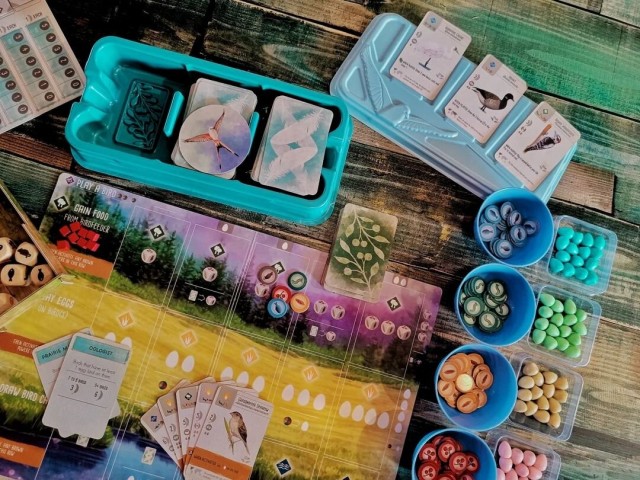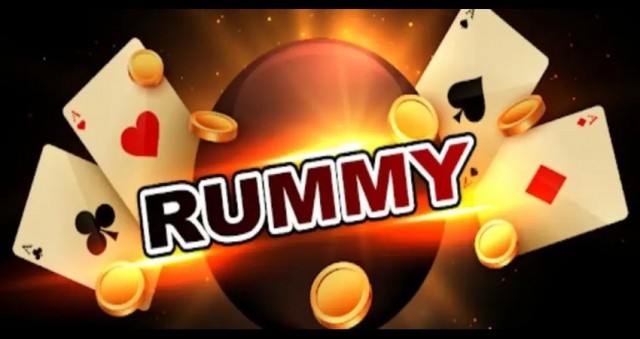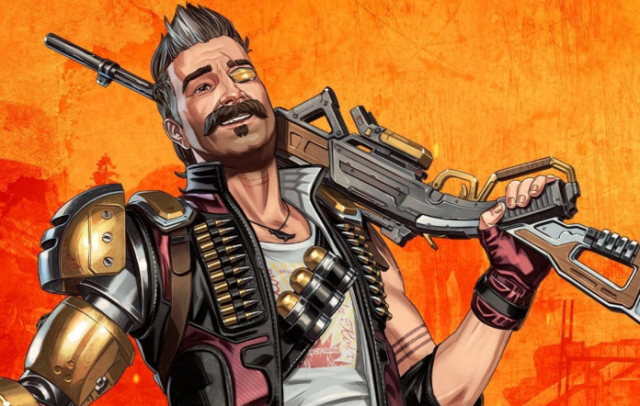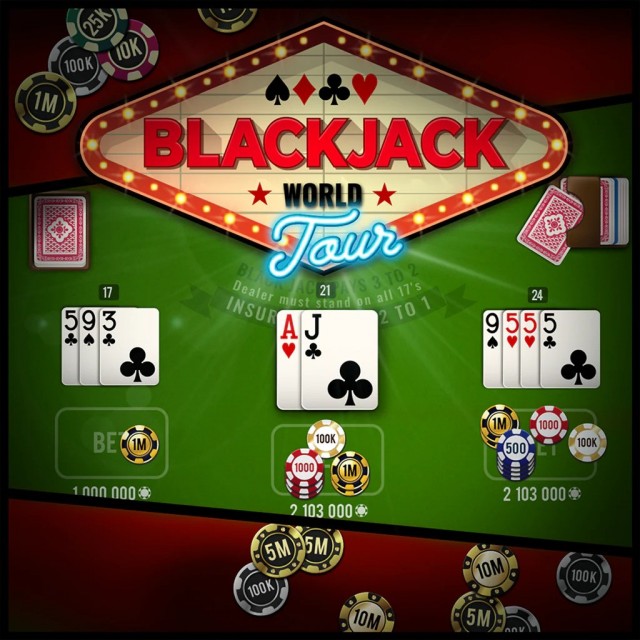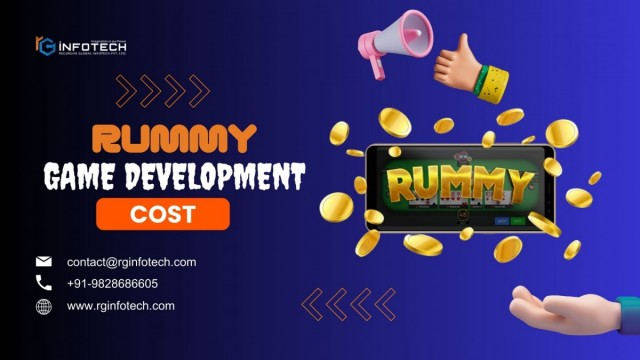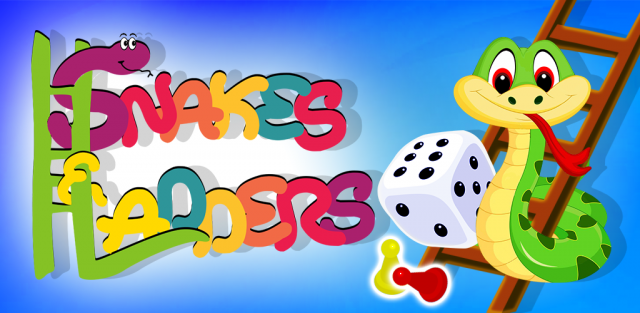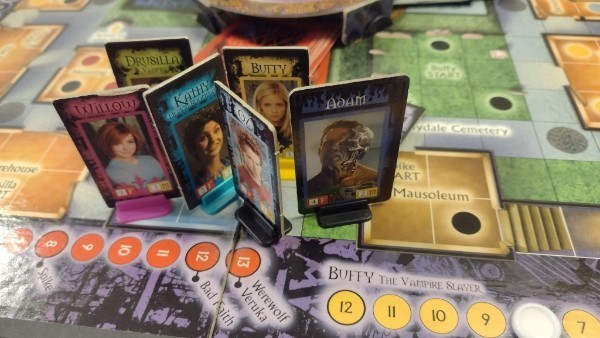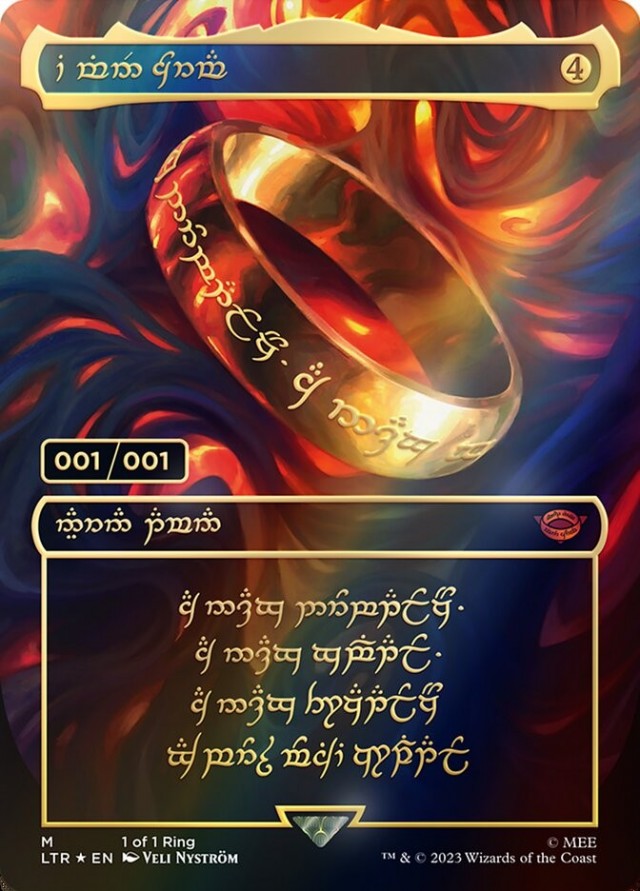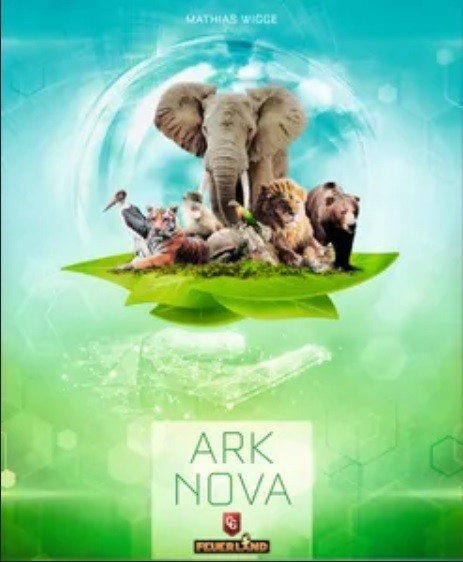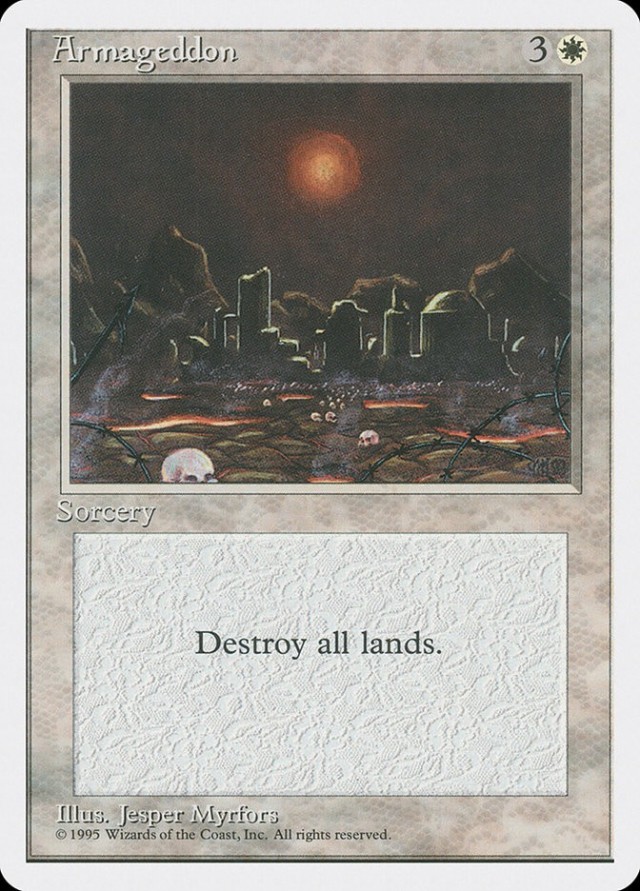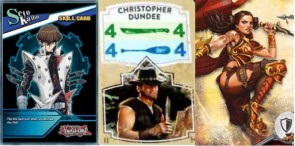Blue Eyes, White Hunter, Red Scorpion.
Yu-Gi-Oh! Speed Duel Decks
First up on the tenth edition of Barnes on Games is more Yu-Gi-Oh. My one-man quest to make today's gamers OK with playing Konami's long-running and often extremely obnoxious card dueler continues with renewed enthusiam as last week saw the release of the new Speed Duel starter sets. These two $10 sets each contain - get this - three decks. One features Yami Yugi, Maximillian Pegasus, and Ishizu Ishtar while the other offers Seto Kaiba, Joey Wheeler, and Mai Valentine. Every character comes with their signature cards, like Blue Eyes White Dragon and Dark Magician. The decks are only 20 cards each, which is the minimum for this format, and they also come with three skill cards for each character. Buy one box, and two people can play three different match-ups, not accounting for playing with different skill cards each game.
Speed Duels is based on my beloved IOS game Yu-Gi-Oh Duel Links. It is an abbreviated, no-bullshit (well, less-bullshit) version of the larger game There's only three monster and trap/spell positions rather than five and the life counter starts at 4000 rather than 8000. Esoteric mechanisms like "Pendulum Summoning" are cut. Only one deck, Joey Wheeler's, has a Fusion summon. Games tend to be really quick (as it says on the tin), with games lasting as few as two turns. I haven't seen a turn one win yet, but I think it might be possible.
Here's what I really dig about this format, and why I think it brings out the best in what is otherwise a cluttered, really rather ramshackle design clotted with who knows how many junk cards, exception based rules, and teeeeeny tiny card text. It requires that players have an extremely focused deck capable of pulling off show-stopping combos as quickly possible. And these preconstructed decks are built with that in mind, and even though I'd never ever play these in Duel Links (come on Mai Valentine, they get the point across with many ways to get monsters on the board quickly to deal damage as fast as possible. If I had to compare it to a famous screen martial artist, it would be Sonny Chiba- it's not that fancy or elaborate with elegant techniques and strategies. It just rips your balls off and hollers.
I also particularly like this format because it's simply easier to play and enjoy. My kids are dueling all the time with these six decks and they are actually playing it correctly without supervision. My son had a Yu-Gi-Oh themed birthday party a couple of weeks ago and watching these kids pretty much just make up rules as they went along was painful. This format scales back the rules and makes it simply more playable.
I'm really looking forward to tweaking these decks to make them even meaner and more aggro than they already are, but "legally" you can only use Speed Duel cards- they have an embossed watermark on them to distinguish them from the mountains of other cards out there. I'm hoping that more decks are released with more characters, as the skills really add a lot to the game. Some are all over field effects that buff monsters, some are one-shots, and others are last-ditch Hail Mary plays.
Even with my interest already whet by Duel Links, I've been really surprised at how much fun we've had with the Speed Duel decks. My son is even announcing all of the plays like they do on the show, which is frequently hilarious, and when he loses I accuse him of not really believing in the heart of the cards or whatever it is they say. Come on folks, ten bucks at Target. Check it out.
Quest for El Dorado: Heroes & Hexes
Back to more familiar territory, the new expansion Heroes and Hexes for Reiner Knizia's Quest for El Dorado has released from Ravensburger and it is an excellent addition to one of 2017's best games. It adds quite a few modular elements, and all of them are fun while also making the game nastier and slightly changing the setting to be a little more sinister. I suppose you could pick and choose which ones you want to play with, but playing with the whole kit has become the done thing as far as I'm concerned.
The big add is three "Cursed" terrain tiles which feature purple curse spaces that cause you to draw a Curse tile that generally does something bad to you, including putting useless Demon cards in your deck. The thing is, cursed hexes are free to move into, which means the temptation to get ahead (or take a shortcut) can be great. And there are new Cave tiles, some of which you can use to gently nudge someone into a Cursed space to obtain their "reward". Cursed tiles also have a couple of tunnels that you can warp through, if you can make it to them. There are also a couple of Cursed barriers to plow through if you want to make sure someone gets Cursed.
As it is a deckbuilder, there are of course some new cards including three new ones to add to the market mix that interact with the new gameplay elements. Each player can also take a Familiar in their seed deck, which acts like any other card but can also be spent for a one time only bonus. A Tavern tile can be placed adjacent to the normal terrain tiles and visitors there can take a single hero out of a draw of three. The heroes are fun, super-charged cards with some pretty obvious pop culture references- there are ersatz versions of Ellen Ripley, Nathan Drake, and Lara Croft among the choices.
This is really kind of the best expansion I've played with in a while. It adds new dimension to gameplay without piling on unnecessary or frivolous subsystems or mechanisms. It feels like it completes and complements the design rather than bolting on more content than the design can bear. And it's reinvigorated interested in the game and it's out on the table again and frequently, so that makes it a big success in my estimation. I've seen this addition for about $15 online, and given that the base game can be had for around $20-25, you've got one of the best values in gaming today with these.
Runebound 3rd Edition
After years of joking about how awful Runebound is (and it was), good notices from folks of taste, class and dignity made me want to take a look at 2015's 3rd edition of this Terrinoth titan. I had read Raf Cordero's reviews back when we were doing Review Corner and was mildly interested, mostly in the controversial pog-flipping combat- why flipping a pog is regarded as less "thematic" as rolling a die, I'll never understand. Anyway, in a YOLO moment I spied a $22 ding and dent copy and had the expected "why the hell did I just buy Runebound" moment.
Well, talk about a turnaround. Lukas Litzinger's revision to a design credited to Martin Wallace is nothing short of a revelation. Frankly, there isn't quite anything else like this edition of Runebound on the market. It's a simple adventure game that is only barely more complex or thoughtful than Talisman, but not nearly as baroque and over-appointed as Arkham Horror. It's definitely not as mind-melty as Mage Knight. It's direct- you move around a map, do a quest, get a reward- and it has very little overhead and requires only a modicum of administration. After playing Fallout, Dungeon Degenerates, Legends of Andor, and a few other games that attempt adventure at this zoom level, none are as straightforward in expressing the concept of moving a hero around a map, doing quests, and getting better at being a hero until you have a big boss fight or complete an overarching storyline.
The narrative is fun, giving you enough to hang your own details on. The time pressure is pretty great, forcing you to consider if it's really worth trying to get ahold of that cloak or that wand that you want to buy. You've got to decide if it's worth the effort to take on a delivery side quest for a payday, and the decision to pitch skill cards to pass a crucial test at pain of losing a good upgrade forever always weighs heavily. If you like that gameplay feeling of having 50 things to do but only time enough to do like five of them then this game might appeal to you. Or, it may frustrate you that so much is on offer but there's barely time to get to most of it in a given game.
The pog combat is brilliant. It works extremely well and it resolves- with detail- quickly. I love that you buy an item and you get a new pog to flip. If you just can't get over what is technically coin-flipping, just think of it as rolling D2s. Like all of the Terrinoth games, it also has surge mechanisms that offer some light tactical choices and unexpected turns. Now, I should also point out that I am playing with the Unbreakable Bonds expansion, and I think that it is in fact pretty essential because it gives you AI boards for each type of monster that mimics the differences between a Savage and a Mystic monster, for example. If you have all day, you can play it as originally written with another player making monster choices. I can't imagine that really adding much to the game, and I think it says a lot that it was kind of overwritten by the expansion.
That leads into the big qualifier about this game. I am playing it strictly solitaire with one character, and I don't believe that will change. I can see no compelling reason to play with other players, and in fact I feel like playing with others will dilute the straightforwardness I cherish about the game. I don't care to do competitive or co-op, but I do think that you can play it competitively is another differentiator. Regardless, I just want to spend about five minutes setting up one of the adventures and about 45 minutes playing through it. I can't imagine sitting down for a 3-4 hour game of Runebound, even as much as I like it.
The expansions other than Unbreakable Bonds are sort of whatever, really. The adventurer packs are fine, you have to buy The Gilded Blade if you want Red Scorpion. The other one has some barbarian dude that is just as generic as the other heroes but is fun to play as a very combat-oriented character. The Adventure Packs are really a better value, adding more cards and mixing up the skills and equipment available. I've been pretty satisfied with the four scenarios offered with the base game and Unbreakable Bonds. They are challenging and even difficult, but not impossible. Caught in a Web, on the other hand, is I believe not possible with a single character. I didn't get the PVP-focused one as it does not seem to offer much for the solo player.
The other big whatever is the Terrinoth setting. It's dull, limp, and completely uninspiring. That said, it kind of works here because it's all just kind of a very basic, call it generic if you will, fantasy quest narrative. I find myself almost wishing that FFG had recast this game as a Middle-Earth game- or even a Star Wars adventure title, as much fatigue and oversaturation as there is for those IPs. There's no reason this excellent base system couldn't support other, more compelling adventure settings.
 Games
Games How to resolve AdBlock issue?
How to resolve AdBlock issue? 